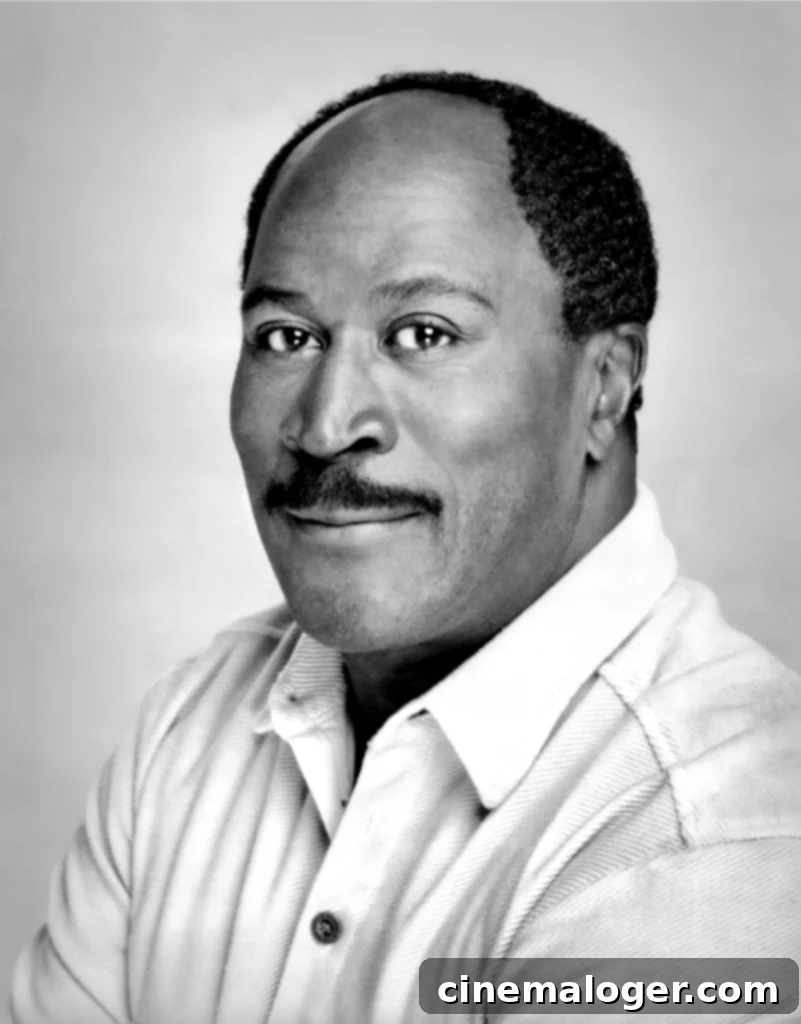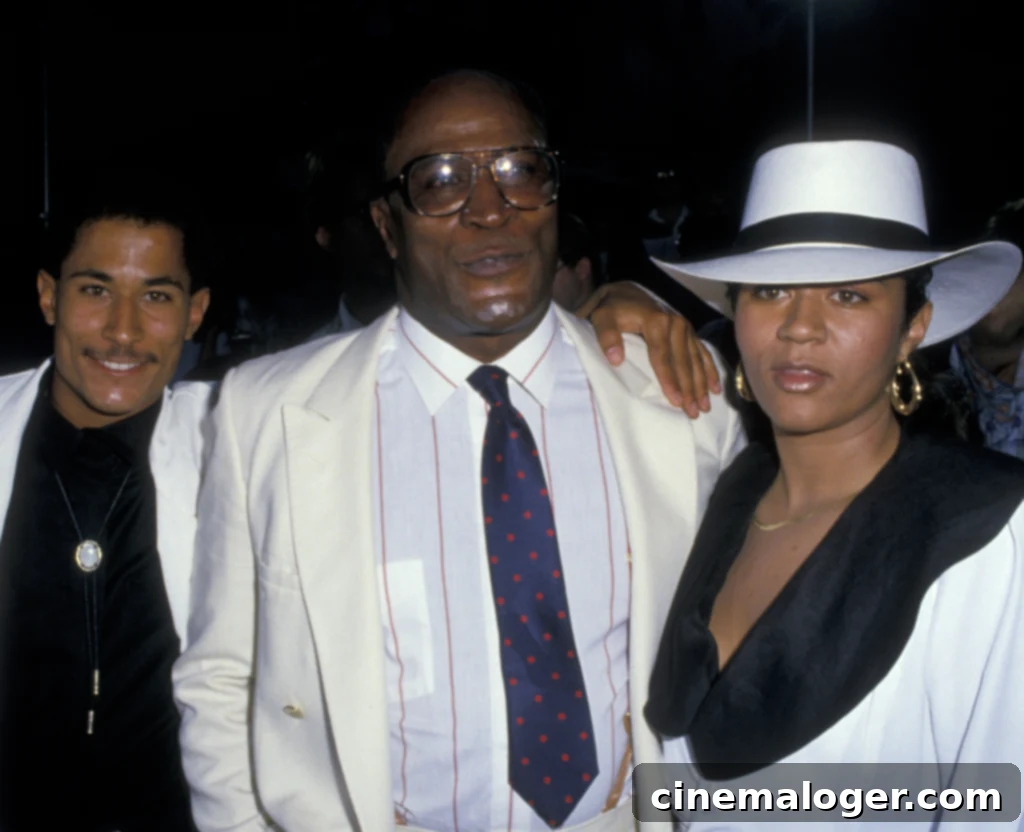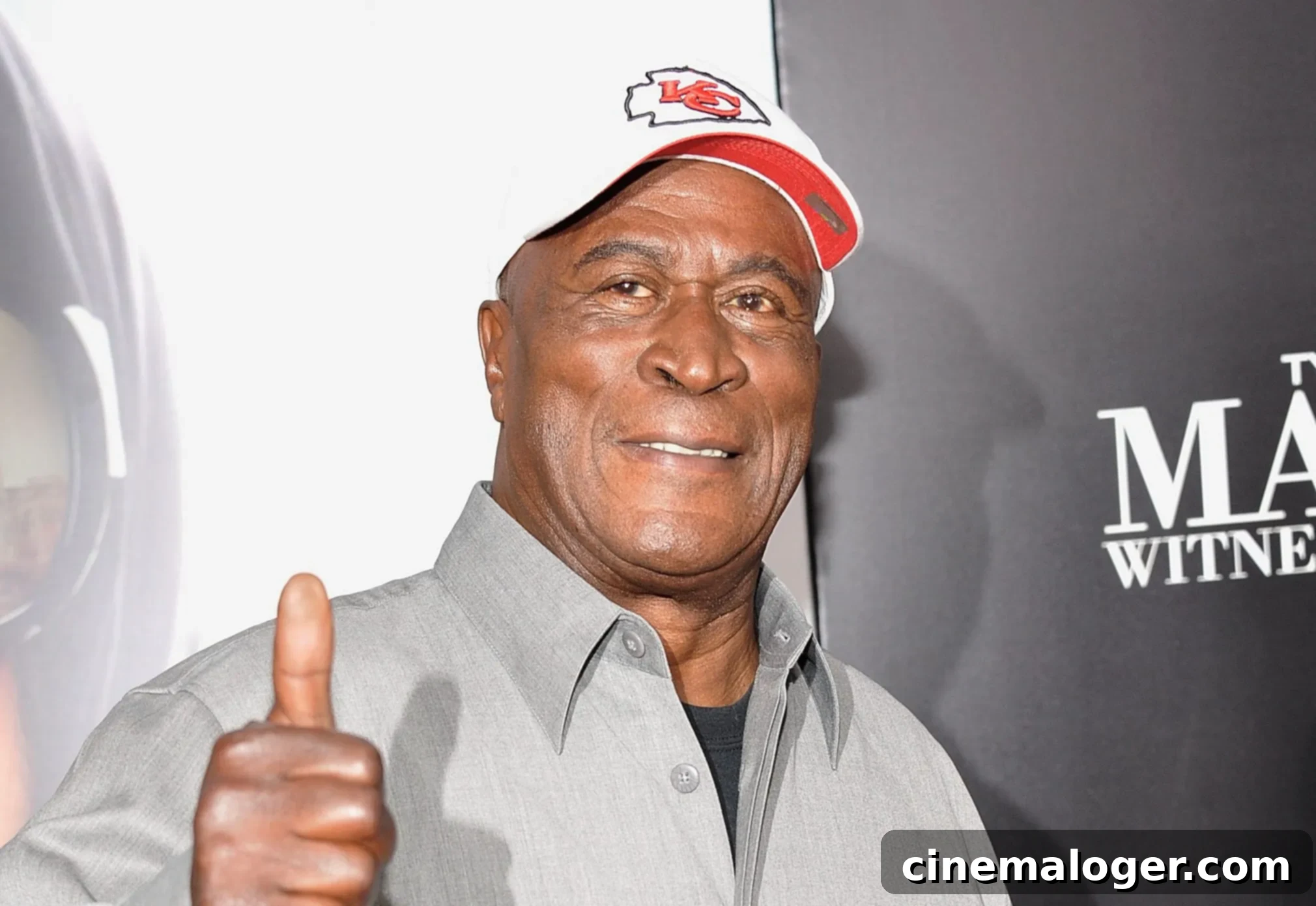Remembering John Amos: Unveiling the Cause of Death of the ‘Good Times’ Icon and His Profound Legacy
The entertainment world recently mourned the passing of a true icon, legendary actor John Amos, who died at the age of 84 in August 2024. However, the news of his death was not made public until nearly two months later, on October 1. This delayed announcement, initially shared by his representative and subsequently confirmed by his son, K.C. Amos, added a somber note to the revelation of an extraordinary life’s end. Fans and colleagues alike began to reflect on the immense contributions Amos made to film and television across an impressive career spanning five decades, leaving an indelible mark on cultural history.
Born in Newark, New Jersey, John Amos solidified his place as one of Hollywood’s most respected and versatile performers. He was best known for his unforgettable roles, particularly as James Evans Sr., the resilient patriarch in the groundbreaking sitcom Good Times, and as the adult Kunta Kinte in the monumental miniseries Roots. Beyond these iconic portrayals, Amos graced screens large and small for over fifty years, cultivating a diverse portfolio that showcased his profound talent and unwavering dedication. His death, confirmed by his son, K.C. Amos, followed a period of quiet, with the beloved actor passing away at home in the summer of 2024 before the official announcement in early October.
K.C. Amos, John’s son, delivered a poignant statement to PEOPLE, confirming his father’s passing and sharing a heartfelt tribute. “It is with heartfelt sadness that I share with you that my father has transitioned,” K.C. expressed. His words painted a vivid picture of a man cherished not only by his family but by millions worldwide: “He was a man with the kindest heart and a heart of gold… and he was loved the world over. Many fans consider him their TV father. He lived a good life. His legacy will live on in his outstanding works in television and film as an actor.” This touching remembrance underscored the deep connection John Amos forged with his audience, transcending the screen to become a paternal figure for many.
K.C. further elaborated on his father’s lifelong passion for his craft, highlighting recent projects that exemplified his enduring dedication. “My father loved working as an actor throughout his entire life,” he affirmed. Among his final roles were a captivating appearance as himself in Suits LA and a prominent feature in “America’s Dad,” a documentary that chronicles his remarkable journey through the acting world. K.C. concluded his statement with a personal touch, revealing the profound bond they shared: “He was my dad, my best friend, and my hero. Thank you for your prayers and support at this time.” These sentiments resonated deeply, illustrating the personal grief intertwined with the public’s loss of a cherished entertainer.
Following the initial announcement and K.C. Amos’s heartfelt tributes, a pivotal detail emerged regarding the actor’s passing. A day later, a death certificate obtained by various media outlets officially disclosed the cause of death, providing clarity to those mourning his loss. This revelation prompted a deeper look into the circumstances of his final days. The following sections delve into the confirmed medical reasons behind John Amos’s death, along with a comprehensive review of his illustrious life, his groundbreaking career, and the loving family he leaves behind.

John Amos’ Cause of Death
While the initial reports from K.C. Amos stated that his father had passed away from “natural causes,” the subsequent release of the death certificate offered more precise medical details. This clarification provided a definitive answer to the circumstances surrounding the beloved actor’s departure, moving beyond general terms to specific findings that shed light on his final moments.
According to the death certificate obtained by TMZ, John Amos’s official cause of death was congestive heart failure. He passed away on August 21 at 5:18 p.m. at a hospital located in Inglewood, California. The document explicitly stated that there were no other significant medical conditions listed as contributing factors to his demise, nor was an autopsy deemed necessary or performed. This information provided crucial insight into the actor’s final health struggles. Furthermore, the certificate revealed that John Amos was cremated on August 30, a mere nine days following his death, marking a swift and private final disposition for the celebrated performer.
In a demonstration of his close involvement during this difficult time, K.C. Amos was officially listed as the informant who reported his father’s death to Los Angeles County authorities. This detail underscores K.C.’s role in handling the logistics and formalities surrounding his father’s passing. Adding to the personal nature of the arrangements, the death certificate also indicated that K.C. Amos is likely in possession of his father’s ashes. The “place of disposition” for the late actor was explicitly noted as K.C.’s residential address, signifying a private and deeply personal choice for his father’s final resting place within the care of his beloved son.
A Career Spanning Generations: Beyond James Evans Sr. and Kunta Kinte
While John Amos is widely celebrated for his iconic performances in Good Times and Roots, his career was remarkably diverse and extensive, touching numerous facets of television and film over five decades. Before his breakout roles, Amos made significant appearances that laid the groundwork for his future success. He first gained widespread recognition as Gordon “Gordy” Howard, the weatherman, on The Mary Tyler Moore Show from 1970 to 1973, showcasing his comedic timing and establishing him as a recognizable face in American households.
Amos continued to build an impressive filmography, starring in notable movies such as the 1975 blaxploitation film Mandingo, and later, the immensely popular 1988 comedy Coming to America, where he played Cleo McDowell, the owner of McDowell’s fast-food restaurant and father of Eddie Murphy’s love interest. He reprised this role in the 2021 sequel, Coming 2 America, demonstrating his enduring appeal and timeless talent. His ability to shift seamlessly between dramatic and comedic roles cemented his reputation as a formidable and adaptable actor.
In later years, Amos continued to grace television screens with impactful performances. He played Percy Fitzwallace in the critically acclaimed political drama The West Wing from 1999 to 2004, and also had a recurring role as Buzz Washington in the dramedy Men in Trees. His commitment to his craft remained undiminished, taking on guest roles in countless series and lending his distinctive voice to animated projects. His final roles, including his appearance in Suits LA and the documentary “America’s Dad,” underscore a career that was active and vibrant until the very end, reflecting his profound love for acting.
Who Was John Amos’ Good Times Character?
In the annals of television history, John Amos’s portrayal of James Evans Sr. on Good Times remains a cultural touchstone. James was the steadfast, no-nonsense patriarch of the Evans family, a working-class Black family striving for a better life in the Cabrini-Green public housing projects of Chicago. His character embodied resilience, dignity, and strong moral values, serving as a vital role model for millions of viewers during the show’s run in the 1970s. James’s commitment to his family and his unwavering pride in the face of adversity resonated deeply, making him one of television’s most beloved fathers. However, despite the character’s popularity and importance, James Evans Sr. was controversially written out of the storyline after just three seasons. This decision stemmed from significant creative differences between John Amos and the series’ writing staff, which the actor later candidly discussed.
Amos was a vocal advocate for authentic representation and resisted storylines that he felt perpetuated negative stereotypes or undermined the dignity of his character and the Black community. In a candid 2017 interview, he shed light on the core of his frustrations. He revealed that at the inception of Good Times, “there had been no African-American writers on the show.” This critical lack of perspective led to scripts that, in his view, often missed the mark in accurately portraying the realities of Black family life. He recalled challenging specific “attitudes they had written, as per my character and, frankly, for some of the other characters as well.” His principled stand often led to clashes, as he recalled producers asking, “What do you mean we can’t do this?” when he pushed back against certain narratives.
Amos’s courage to speak truth to power was evident in his direct challenge to the writers’ lack of understanding. As quoted by Ebony, he vividly recounted his retort: “They’d go on about their credits and the rest of that, and I’d look at each and every one of them and say, ‘Well, how long have you been Black? That just doesn’t happen in the community. We don’t think that way. We don’t act that way. We don’t let our children do that.'” This powerful statement highlighted the cultural disconnect and Amos’s unwavering commitment to depicting a realistic and respectful image of a Black family on national television. His insistence on authenticity ultimately led to his character’s untimely death on the show, but his principled stance left an enduring legacy of integrity and advocacy for accurate representation in media.
The Transformative Role: John Amos as Kunta Kinte in Roots
While his departure from Good Times was controversial, it paved the way for another career-defining role that would cement John Amos’s status as a pivotal figure in television history: his portrayal of the adult Kunta Kinte in the 1977 miniseries Roots. Based on Alex Haley’s seminal novel, Roots was a cultural phenomenon that captivated an unprecedented audience, bringing the brutal realities of slavery into millions of American homes. Amos’s performance as the defiant, resilient West African warrior captured and enslaved, was deeply powerful and heartbreaking.
His portrayal of Kunta Kinte as he navigated the horrors of the slave trade and plantation life, enduring unimaginable suffering while clinging to his heritage and identity, was critically acclaimed. Amos conveyed the profound emotional and physical toll of slavery with gravitas and authenticity, leaving an indelible mark on viewers. Roots not only won numerous awards, including nine Emmy Awards, but it also sparked national conversations about race, history, and identity, fundamentally changing how America viewed its past. John Amos’s contribution to this groundbreaking series was instrumental in its success and its lasting impact on education and social consciousness, further showcasing his range as a dramatic actor.

John Amos’ Children
Beyond his professional achievements, John Amos was a devoted family man. He was a father to two accomplished children, Kelly Christopher “K.C.” Amos and Shannon Amos, both of whom he shared with his first wife, Noel Mickelson. John and Noel were married for a decade, from 1965 to 1975, establishing a foundational period of his life. K.C. Amos has followed in his father’s footsteps, making his own mark in the entertainment industry as an actor, writer, and director. Shannon Amos, similarly, has carved out a successful career as an award-winning executive producer, writer, and founder of her own media company, ensuring the Amos legacy continues in creative fields. Their close bond with their father was evident, particularly in K.C.’s touching statements following John’s passing and their collaborative efforts on projects like the “America’s Dad” documentary, celebrating his life journey.
Following his marriage to Noel, John Amos entered into a second marriage with actress Lillian Lehman. Their union, though brief, spanning from 1978 to 1979, was another chapter in his personal life. Despite the public nature of his career, Amos maintained a relatively private family life, cherishing the relationships that anchored him throughout his celebrated journey. His children and grandchildren now carry forward the torch of his enduring spirit and remarkable contributions.
The Enduring Legacy of John Amos: An Icon Remembered
John Amos’s passing leaves a void in the entertainment industry, but his legacy as an actor, advocate, and family man will undoubtedly endure for generations. From his early days on The Mary Tyler Moore Show to his powerful dramatic turns in Good Times and Roots, and his later comedic and dramatic roles, Amos consistently brought depth, integrity, and authenticity to every character he embodied. He was more than just an actor; he was a cultural figure who used his platform to challenge stereotypes and champion dignity, particularly in his groundbreaking portrayal of James Evans Sr.
His courageous stance against misrepresentation on Good Times underscored his commitment to his community and his art, making him a trailblazer for future generations of Black artists. The emotional resonance of his performance as Kunta Kinte in Roots helped reshape America’s understanding of its history. John Amos’s work transcended entertainment, contributing significantly to social commentary and the ongoing dialogue about racial identity and justice. He will be remembered not only for his unforgettable characters but for the profound impact he had on the cultural landscape, earning him the affectionate title of “America’s Dad” and a permanent place in the hearts of those he entertained and inspired. His life was a testament to perseverance, talent, and an unwavering commitment to storytelling that mattered.
